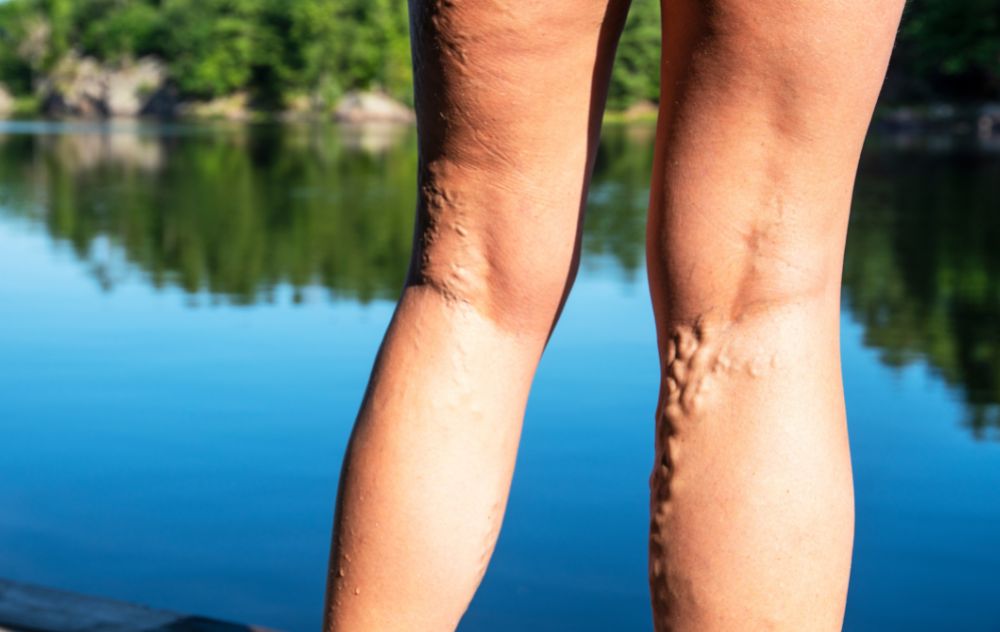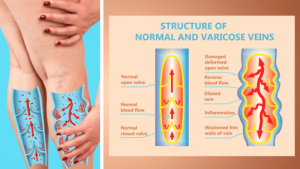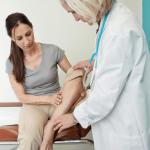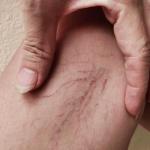
Having bulging, twisted veins on your legs can be embarrassing and uncomfortable. But varicose veins are only the beginning. If left alone, varicose veins won’t go away on their own. They can also lead to more serious health problems down the road.
However, you don’t have to continue living with vein symptoms. There are effective treatments that can help your varicose veins disappear. Vein treatments also help prevent further complications and improve your vein health.
This article explains what happens to your leg veins when you have varicose veins and what you can do to help them disappear, boost your circulation, and protect your vascular health.
Sign Up for Our Newsletter for Vein Health Tips
What Causes Varicose Veins?
Vein disease, or venous insufficiency, is the underlying cause of varicose and spider veins. When tiny valves in your veins weaken, vein disease can begin to develop.
Vein valves malfunction when your veins are placed under strain.
This can begin due to a range of reasons, such as being overweight, too sedentary, or having high blood pressure. Whatever the reason, your vascular veins will then struggle to pump blood back to your heart.
When vein valves become damaged, they likely will not repair themselves, so varicose veins do not disappear on their own.
Can Varicose Veins Go Away?
Varicose veins won’t naturally disappear on their own, and you shouldn’t ignore your symptoms. Waiting for them to disappear on their own can worsen your symptoms and overall condition, leading to chronic venous insufficiency (CVI).
Will Varicose Veins Go Away on Their Own?
Varicose veins typically do not go away on their own. They are caused by weakened or damaged valves in the veins, which leads to blood pooling and the veins becoming enlarged and twisted. Without intervention, varicose veins often persist and may even worsen over time.
Varicose veins are linked to a range of symptoms, some of which are painful, can impact your sleep, or stop you from living a healthy, active lifestyle. Common symptoms include:
- Throbbing or aching pain in the legs
- Swelling
- Numbness
- Leg cramps
- Restless legs
- Itchy skin
If you notice these symptoms, you might have early-stage chronic venous insufficiency. If you ignore the early symptoms, it’s important to see a doctor. If left unaddressed, vein damage can worsen. And so will your circulation.
As a result, you may notice symptoms of more advanced chronic venous insufficiency start to develop: swelling, a feeling of numbness or heaviness in the legs, followed by skin changes, including itchy skin, a venous rash, thickening of the skin, and discoloration.
Chronic venous insufficiency can put you at risk for serious health conditions, and in that way, varicose veins can be dangerous. If you leave varicose veins untreated, you are more at risk for venous ulcers, deep vein thrombosis (DVT), and pulmonary embolism.
Can Varicose Veins Go Away after Pregnancy?
Varicose veins that develop during pregnancy often improve or disappear within a few months after giving birth. This improvement occurs because the increased blood volume and hormonal changes during pregnancy, which contribute to the development of varicose veins, return to normal levels postpartum. Additionally, the pressure on the veins in the lower body decreases once the baby is born.
However, while some women may see significant improvement or complete resolution of varicose veins after pregnancy, others might still experience persistent varicose veins. Factors influencing this include:
- Genetics: A family history of varicose veins can increase the likelihood of their persistence.
- Number of Pregnancies: Multiple pregnancies can increase the risk and severity of varicose veins.
- Severity During Pregnancy: The more severe the varicose veins during pregnancy, the less likely they are to completely disappear afterward.
To support vein health during and after pregnancy, consider the following measures:
- Regular Exercise: Promotes good circulation and can help reduce vein pressure.
- Elevating the Legs: Helps reduce pressure in the leg veins.
- Wearing Compression Stockings: Can improve blood flow and alleviate symptoms.
- Maintaining a Healthy Weight: Reduces the pressure on the veins.
If varicose veins persist or cause significant discomfort postpartum, it’s advisable to consult a healthcare provider.
When Should You Worry About Varicose Veins?
If you have varicose or spider veins, that means the valves in your veins are malfunctioning. As such, it’s a good idea to see a vein specialist. An experienced doctor will be able to identify how much damage is present and recommend a personalized treatment plan to help prevent further damage and support your vein health.
We advise not to wait until your symptoms worsen and varicose veins progress into advanced stages of CVI.
Contact USA Vein Clinics
At USA Vein Clinics, we treat the underlying cause of varicose veins and spider veins with non-surgical, outpatient procedures. If you would like to learn more, schedule a consultation at a vein clinic near you — we have over 160 locations across the country. Our experienced vein doctors can provide you with the expert care and treatment you need to eliminate varicose veins.






